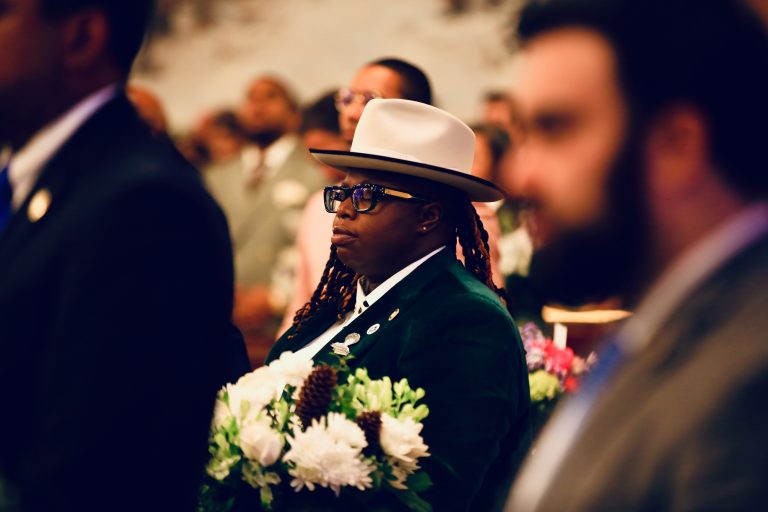Challenges Faced by LGBTQ+ Residents Lead to Solution-Based Community Organizing
By Atiya Irvin-Mitchell
While statistics on the city’s Black LGBTQ+ population haven’t been tracked through the years, an estimated 3% of Pittsburgh’s population is LGBTQ+ as of 2021. Chauntey Porter, a Black trans woman, is a lifelong Hill District resident. Yet, the 44-year-old says she often feels unsafe in Pittsburgh. According to her, living in the Steel City comes with its share of ups and downs for Black and LGBTQ+ people who must be vigilant and fight hard to have their voices heard. As a result, Porter spends most of her time trying to improve the city for its most vulnerable residents by planning workshops, panel discussions, and lobbying for protections for formerly incarcerated individuals.
Findings from a National Crime Victimization Survey show that transgender people experience violence at four times the rate of their cisgender counterparts. In the past decade, as reported by Human Rights Campaign, over 300 transgender and nonbinary individuals were victims of fatal violence with two-thirds of those victims being Black transgender women.
“When I walk out my door, I have to be concerned if that day is gonna be my last day,” she says. “The police are always [thinking] that when violence happens to a Black trans woman, we asked for it.”
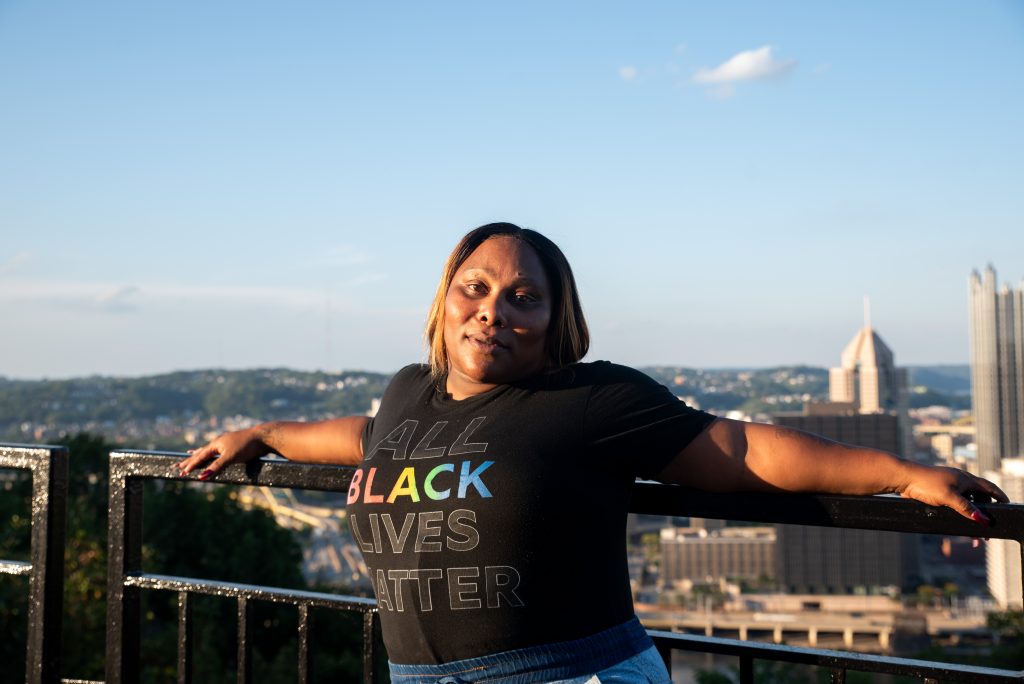
Porter is the current president of TransYOUniting, an advocacy organization that serves Pittsburgh’s trans community by providing crisis housing, food assistance, and needed support through organizational partners. Additionally, she is the founder of the Love Diamond Project, which lobbies for the rights of incarcerated LGBTQ+ individuals and those living with HIV. Porter started the organization after having struggled until 2021 to change her legal name due to a state law that forbade individuals with felony records from doing so. As a result of testimony from Porter and others, as well as the diligence of the Reed Smith law firm and the Pittsburgh Trans Defense Fund, a judge ultimately determined that it was unconstitutional for residents with felony records to be prohibited from changing their names. Porter says it was important to her to challenge the law because she deemed it cruel and unusual punishment.
Whether you’re LGBTQ+, whether you are poor and so many other pieces of our identities in our community, I just felt like I was the right leader for this time. Against a political system that was inherently set up not to support a candidate like me.
State Representative La-Tasha Mayes
While Porter takes pride in her role in having the name-change law amended, she believes a lot more remains to be done in support of Black LGBTQ+ people in Pittsburgh. “When you’re Black and you’re transgender or when you’re Black and you’re very overly gay, a lot of times [finding] meaningful employment is hard because people discriminate,” says Porter. She believes this is further complicated by having a felony on your record. “If you did your time, why keep holding that over your head when you’re trying to be a model citizen?”
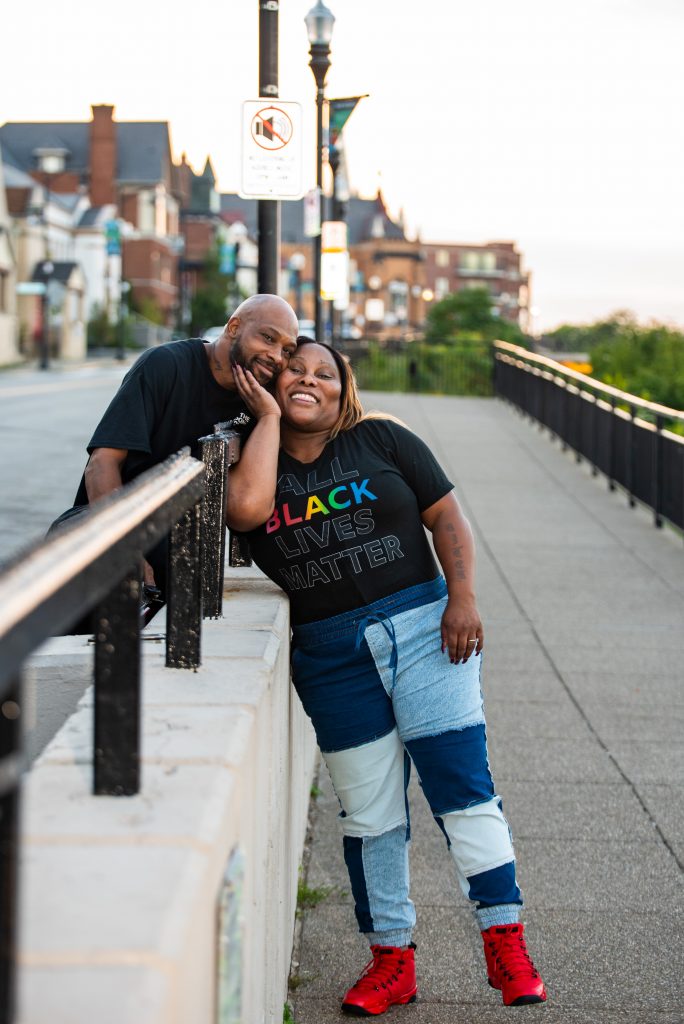
While the city was once crowned one of the country’s most livable cities in America by Forbes magazine, that is not the case for everyone. In 2019, the city’s Gender Equity Commission reported that high poverty rates, infant mortality rates, and over-policing made Pittsburgh unlivable for Black women. Similarly, according to individuals interviewed by BlackPittsburgh.com, being a Black LBGTQ+ person in Pittsburgh demands constant resistance to erasure and exclusion.
A Tale of Two Prides
Annually, June is Pride Month in the U.S. with people nationwide commemorating the 1969 Stonewall Riots that led to a series of protests for gay rights and liberation. While Black trans people such as Marsha P. Johnson were instrumental to that historical moment, there is often a racial divide in celebrating Pride. In many cities, Black LGBTQ+ residents often skip the mainstream celebrations and hold their own.
For example, Black Pride celebrations take place in May in Washington, D.C. In Philadelphia, the most recent Black Pride celebration took place in April. In our own city of Pittsburgh, the end of July has marked the beginning of Black Pride Week since 1995. What has led to these divergent traditions? According to former Pittsburgh Black Pride president Andre Brown, Black Pride celebrations were created in the 1990s to counteract the erasure that many experienced. This has yet to be alleviated.
“We exist and we continue to exist because our needs, our culture, our aesthetic, everything about us is not reflected in mainstream Pride events that tend to reflect white culture,” Brown said. “So, we wanted to create a space where we can celebrate ourselves. We can listen to our music. We can talk about the social and political things that impact us. It’s a need that’s there because Pride isn’t always inclusive of everyone.”
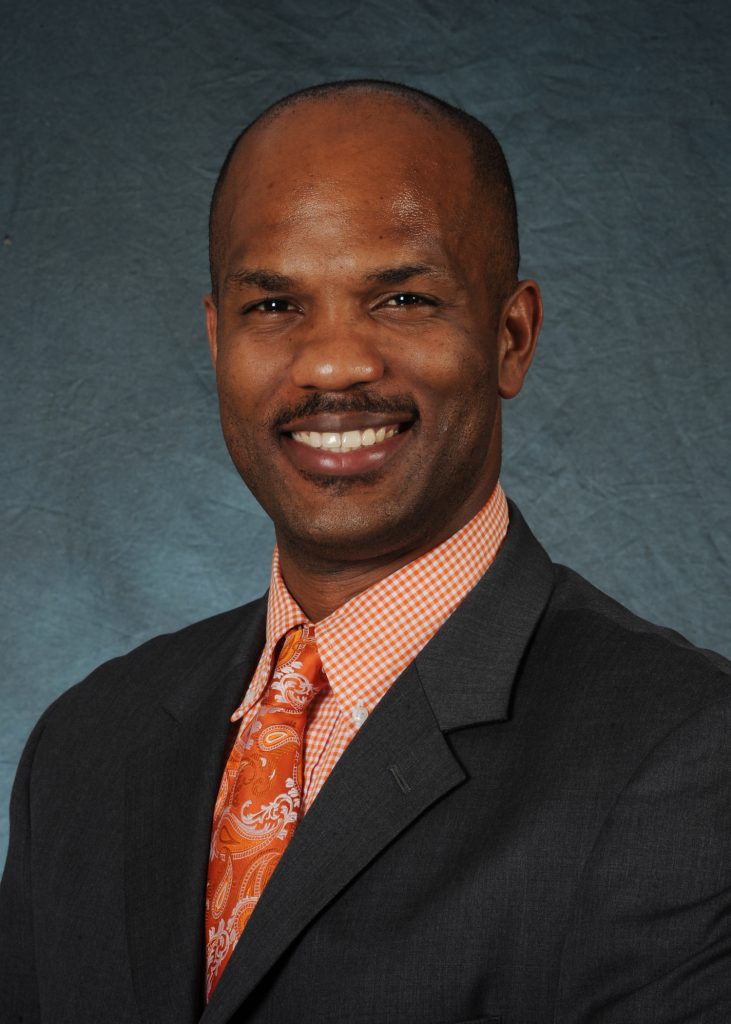
Brown, who is not a Pittsburgh native, grew up in a Rust Belt city in Michigan and observed that many Rust Belt cities have endured periods of economic depression and uncertainty. If you’re a Black LGBTQ+ person in a city like Detroit or Pittsburgh, Brown said, struggles such as unemployment or lack of healthcare will be exacerbated. As a result, Pittsburgh Black Pride operates year-round and offers programming to meet the needs of LGBTQ+ residents in Pittsburgh and southwestern Pennsylvania. This ranges from social events like community BBQs to co-sponsoring self-defense seminars.
“Our levels of poverty are higher, our experiences with violence and discrimination tend to be higher. There’s a saying [that] when white America gets a cold, Black America gets pneumonia,” Brown said. “I think that in that same vein, then Black LGBT folks are going to get COVID and pneumonia because we are being faced with the intersections of racial discrimination and then we also have discrimination based upon our sexual orientation or gender identity.”
When I walk out my door, I have to be concerned if that day is gonna be my last day.
Chauntey Porter, founder of TransYOUniting
Brown added that while fighting invisibility is universal within the Black LGBTQ+ community, there are struggles that nonbinary and Black trans people deal with that cisgender gay men like him don’t have to confront. According to him, it’s important to understand that all systems of oppression are intertwined, and solidarity is the only path to liberation.
“[As] Black LGBT folks, we have to also be rendered visible in mainstream Black initiatives and we also have to be rendered visible in mainstream LGBT activism and initiatives as well,” Brown said. “One thing we constantly have to [resist] is proving that we matter [and] proving we don’t deserve to be discriminated against from our own communities because of our race or our sexual orientation or gender identity.”
Creating Safe, Sustainable Spaces
Looking back on his 15 years of advocacy in Pittsburgh, Terrence McGeorge noticed an ongoing problem. Many predominantly white LBGTQ+ organizations were unwilling to create physical spaces for Black LGBTQ+ community members to gather. From the city’s Gay and Lesbian Community Center (now renamed the PGH Equality Center) to a community planning group for HIV and AIDS, McGeorge observed the constant sense of othering many felt, which led to very harmful outcomes at times.
“A lot of my friends were becoming positive, which was weird because I also had them in some of the same programs as me,” McGeorge said. “But one of the things that they would always say is they didn’t feel comfortable. They felt like the larger LGBTQ+ community, the white community, just didn’t understand them.”
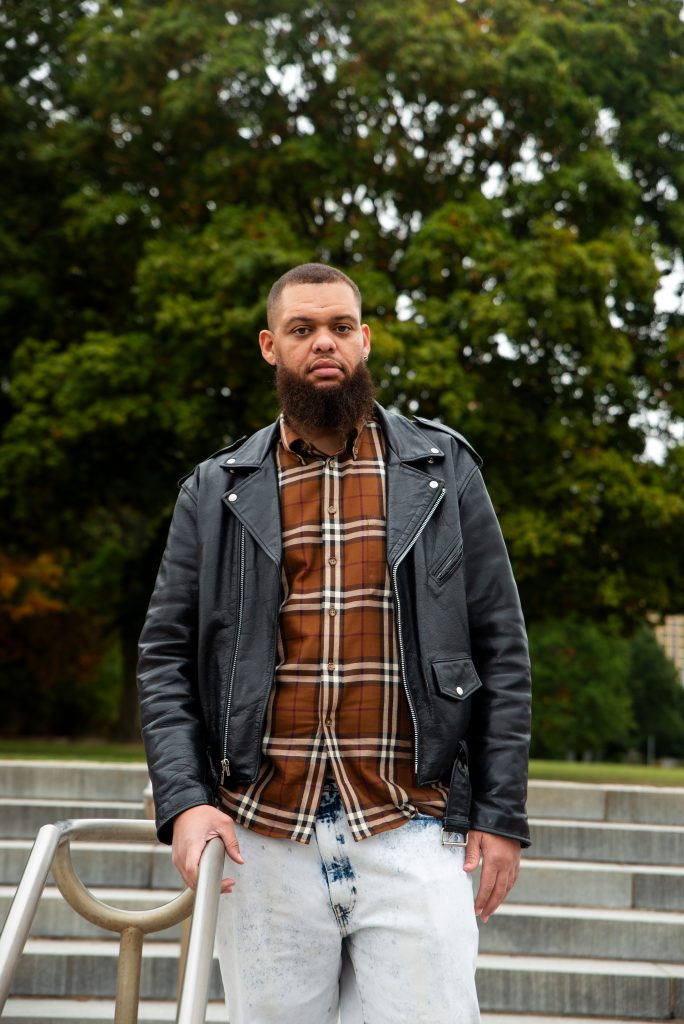
He explained that, more often than not, the organizations limited their outreach. His peers also did not benefit from their resources because they felt unwelcomed. In hopes of combatting this and giving young Black community members a place to belong, McGeorge and his cofounder Miguel Bell started a youth drop-in center called Project Silk to fill in the gaps left by mainstream attempts at outreach.
“You could come to Project Silk to get a referral to a home. You come to Silk to get tested for HIV. You can come to Silk to learn some skills as far as job readiness, but you can also come to learn how to vote,” McGeorge said.
We wanted to create a space where we can celebrate ourselves. It’s a need that’s there because Pride isn’t always inclusive of everyone.
Andre Brown, former Pittsburgh Pride President
Although McGeorge is no longer involved in the day-to-day running of the organization, he still thinks the work that Project Silk does is important, but laments that there are no true safe spaces for Black LBGTQ+ residents within the city. Additionally, he believes that the spaces that Black LGBTQ+ people try to carve out for themselves can, at times, be complicated.
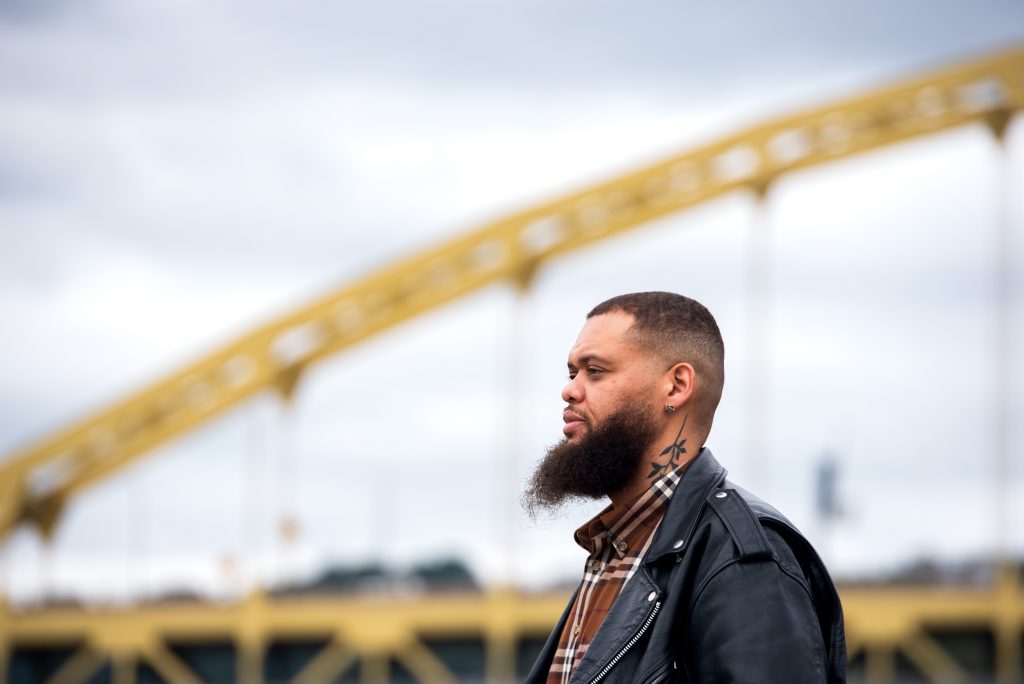
“There really is no true space for us. I mean we create spaces, but we don’t have a gay Black bar. Project Silk is great. But all the workers that work there are Black [while] Silk isn’t run by a Black organization,” McGeorge said. “I say that to say this, it’s very hard for us to find space. So, I feel like to live in the city of Pittsburgh, you have to create your own opportunities because there are no opportunities for Black LGBT.”
Ciora Thomas, who is Black and transgender, experienced homelessness during her youth, as an estimated one in five transgender individuals have, according to the National Center for Transgender Equality. This led her to spend her teens and twenties engaged in social work and activism. The culmination of her work was founding SisTers PGH, a transgender rights advocacy organization that acts as a drop-in center and allows for trans and nonbinary people to access resources and temporary housing. Started inside of Thomas’ own apartment in 2013, SisTers PGH was created to address the lack of resources available to Black trans people struggling with homelessness within the city.
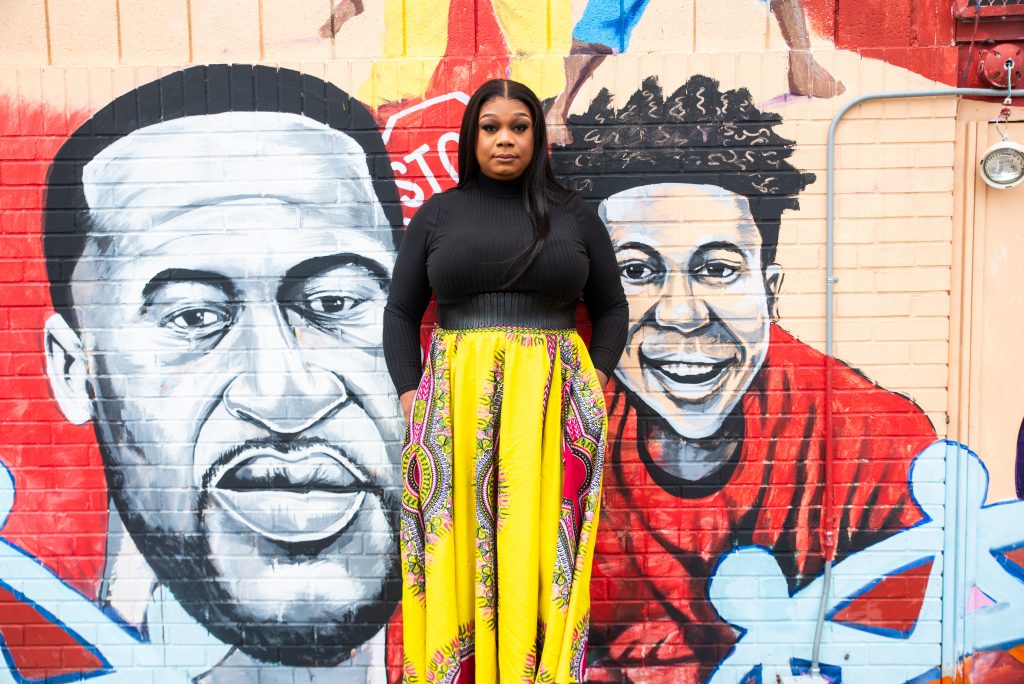
“It was vital that we created our own platform and our own space to center our needs, center or future needs, and the generational wealth and economics that we needed and still need as a community,” Thomas said. “It was important to focus on housing because [we’re] facing housing discrimination in Pittsburgh.”
Despite the U.S. Department of Housing and Urban Development stating that discrimination against transgender renters or homebuyers based on gender identity or gender stereotypes constitutes sex discrimination and goes against the Fair Housing Act, one in five transgender individuals report experiencing discrimination when searching for housing. Thomas believes organizations like SisTers PGH are essential in cities like Pittsburgh that routinely exclude Black trans people.
“Trans folks always fall through the cracks,” she said. “Even when we’re talking about support for Black people, trans people, queer people always fall through the cracks. And [we] are not heard or seen or recognized as human beings that need housing or employment or resources. [This has] to be sustainable and not seen as needing support.”
The exclusion is why the organization has hosted an alternative People’s Pride march and celebration since 2017. According to Thomas, the event is designed to uplift nonprofits, school districts, unions, and community members who have been “neglected” by the mainstream celebration. She believes that being Black and LGBTQ+ in Pittsburgh means always relying more on the community for support than the city as a whole.
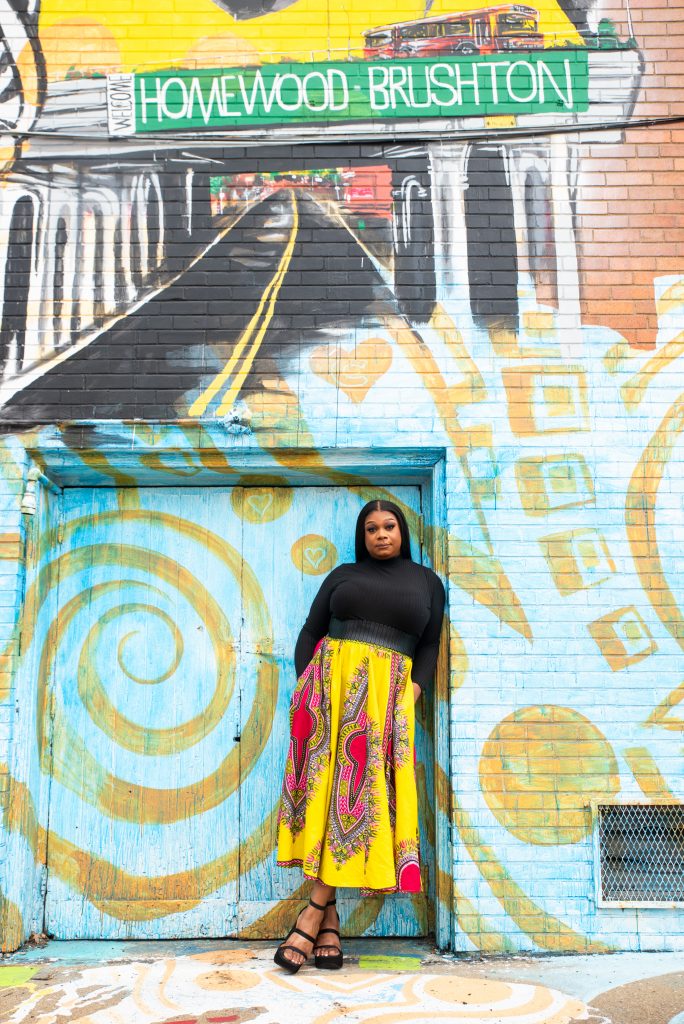
“It’s been hell on wheels, but what I am glad about is that we have this space that affirms our community – no matter what,” Thomas said. “If no one else outside of our trans community is going to support us, then being able to stand on our own feet is what we thought we [would] do here [at SisTers PGH].”
Out, Proud, and in Political Office
On January 3, 2023, La’Tasha Mayes was sworn into the Pennsylvania House of Representatives District 24, occupying the seat formerly held by current Mayor Ed Gainey. Both made history with Gainey as Pittsburgh’s first Black mayor and Mayes as the first openly lesbian politician to be elected to the Pennsylvania House. Although Mayes is from Philadelphia, she believed her lifelong social justice advocacy and community-based efforts made her uniquely qualified to represent the district. Inspired by Gainey’s run for mayor, she felt that she could disrupt politics in a positive way during such a tumultuous time in the country.
“I’m the person for this time, a time when Roe v. Wade will come to an end. In the age of COVID-19,” Mayes said. “Whether you’re Black, whether you’re a woman or [a] gender-expansive person, whether you’re LGBTQ+, whether you are poor and so many other pieces of our identities in our community, I just felt like I was the right leader for this time. Against a political system that was inherently set up not to support a candidate like me.”
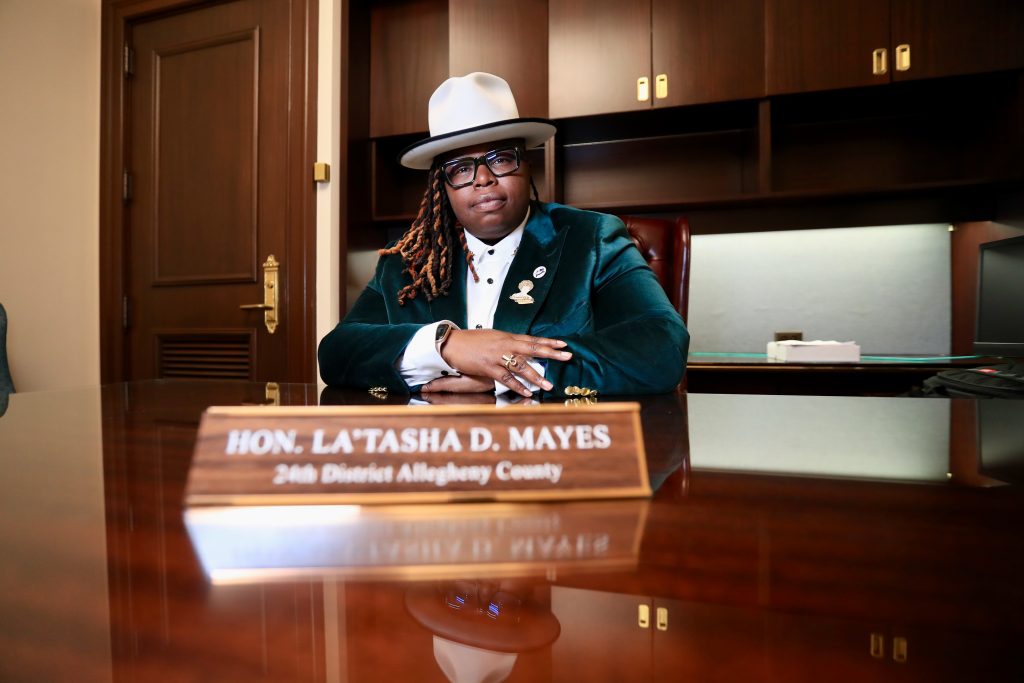
Mayes argues that Black Americans have always had a rich history in Rust Belt cities and is optimistic about what it means for Black and LGBTQ+ people to live in cities like Pittsburgh. In her opinion, the Steel City, like many other Rust Belt cities, is reinventing itself and constantly changing. That can be advantageous to Black LGBTQ+ people who often disrupt the status quo.
“When we think about the Rust Belt, we have this image of a white working-class man, and my presence in this city is disruptive to that idea. It interrupts this thinking that only white people live in the Rust Belt,” Mayes said. “We’ve always created our own spaces for Black LGBTQ+ communities, [but] it’s still not enough. We don’t have all the resources, all the spaces, all the networks and connections, and businesses that are vital to any community. There’s been infighting. There’s been divisions. But there’s also been amazing collaboration and partnerships among Black LGBTQ+ leaders. And I hope my work, anything that I’ve done, has contributed to that.”
Although hope for the future is a common thread in the perspective of all these activists, they also understand that much more work needs to be done to make Pittsburgh more desirable and holistic for its LGBTQ+ residents.
Atiya Irvin-Mitchell is a Pittsburgh-based freelance writer. She can be reached at airvinmitchell@gmail.com and you can follow her on Twitter @AtiyaWrites.


